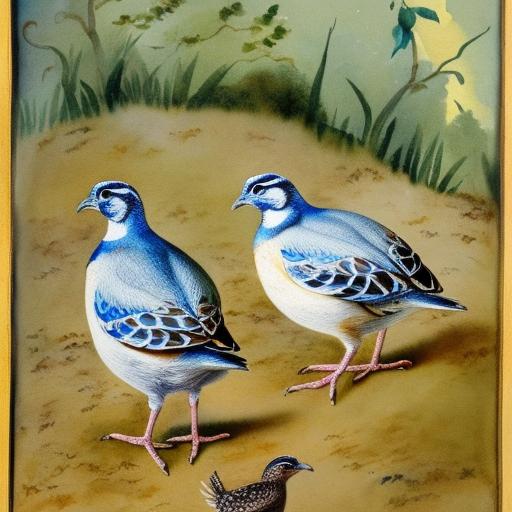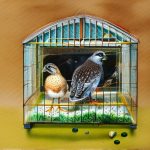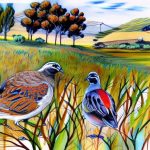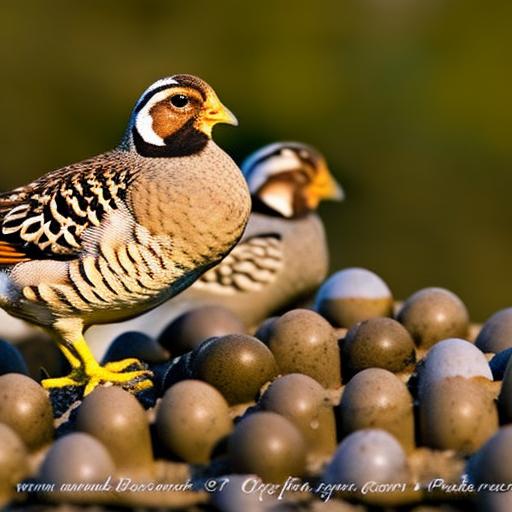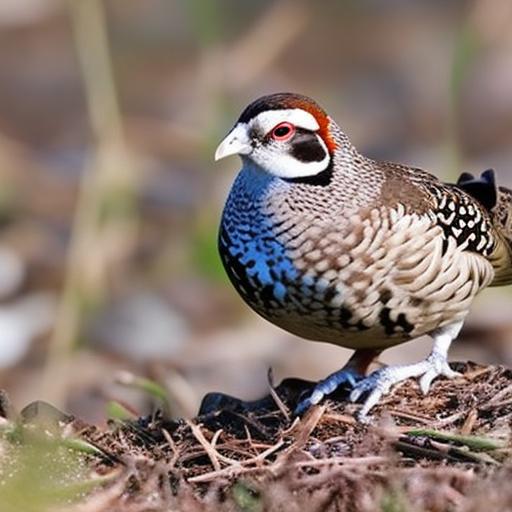Quail breeding is a fascinating and rewarding endeavor for many poultry enthusiasts. Understanding the quail breeding period is crucial for successful breeding. Quails are known for their prolific breeding habits, with some species being able to lay up to 300 eggs in a year. The breeding period for quails typically begins in the spring and continues through the summer months. During this time, quails become more active and vocal, and males will often engage in elaborate courtship displays to attract females.
The breeding period is also characterized by an increase in egg production, with female quails laying eggs every 1-2 days. It’s important to note that quails are highly social birds and prefer to breed in groups, so providing a suitable environment for social interaction is essential for successful breeding. Understanding the natural breeding behaviors of quails, such as courtship displays and egg-laying patterns, is key to maximizing breeding success. By closely observing their behavior and providing the right conditions, breeders can ensure a healthy and productive breeding period for their quails.
Key Takeaways
- Quail breeding period typically occurs in the spring and summer months
- Factors affecting quail breeding include nutrition, lighting, and temperature
- Select breeding stock based on health, size, and egg production
- Create a breeding environment with proper lighting, ventilation, and nesting areas
- Manage quail breeding behavior by minimizing stress and providing a balanced diet
- Care for quail chicks by providing warmth, proper nutrition, and protection from predators
- Maximize quail breeding success by monitoring health, providing a clean environment, and proper record-keeping
Factors Affecting Quail Breeding
Several factors can affect quail breeding, including environmental conditions, nutrition, and genetics. Environmental factors such as temperature and lighting can have a significant impact on quail breeding. Quails are sensitive to changes in temperature and require a consistent and comfortable environment to breed successfully. Providing the right lighting conditions, such as a natural daylight cycle or artificial lighting, can also stimulate breeding behavior in quails.
Nutrition is another crucial factor that can affect quail breeding. A well-balanced diet that is high in protein and essential nutrients is essential for maintaining the health and reproductive success of quails. Breeding stock should be provided with a diet that meets their specific nutritional needs to ensure optimal breeding performance. Genetics also play a significant role in quail breeding, as certain genetic traits can influence fertility, egg production, and overall reproductive success. Selecting breeding stock with desirable genetic traits can help improve breeding outcomes and produce healthier offspring.
Selecting Breeding Stock
Selecting the right breeding stock is essential for successful quail breeding. When choosing breeding stock, it’s important to consider factors such as health, genetics, and temperament. Healthy breeding stock is crucial for producing strong and viable offspring. Look for birds that are active, alert, and free from any signs of illness or disease. It’s also important to select breeding stock with desirable genetic traits that contribute to high fertility, egg production, and overall reproductive success.
Temperament is another important consideration when selecting breeding stock. Quails with a calm and non-aggressive temperament are more likely to engage in successful breeding behavior and provide a stable social environment for the group. Additionally, consider the age of the breeding stock, as younger birds are generally more fertile and productive than older birds. By carefully selecting breeding stock based on health, genetics, temperament, and age, breeders can improve the overall success of their quail breeding program.
Creating the Right Breeding Environment
Creating the right breeding environment is essential for maximizing quail breeding success. The breeding environment should provide adequate space, shelter, and nesting areas for the quails to engage in natural breeding behaviors. Quails are social birds and prefer to breed in groups, so providing a spacious and well-structured environment is important for promoting social interaction and minimizing stress.
Nesting areas should be provided to accommodate the egg-laying habits of female quails. Nesting boxes or areas with suitable nesting materials can encourage females to lay eggs in a safe and comfortable environment. The breeding environment should also be kept clean and free from any potential hazards or stressors that could disrupt breeding behavior. Additionally, providing the right temperature and lighting conditions can help stimulate breeding behavior in quails. By creating a suitable breeding environment that meets the social, nesting, and environmental needs of quails, breeders can enhance the overall success of their breeding program.
Managing Quail Breeding Behavior
Managing quail breeding behavior is essential for maintaining a healthy and productive breeding program. Understanding the natural behaviors of quails, such as courtship displays, mating rituals, and egg-laying patterns, is crucial for promoting successful breeding behavior. Providing a suitable environment that allows for natural social interactions and courtship displays can help stimulate breeding behavior in quails.
It’s also important to monitor the behavior of the breeding stock closely to identify any signs of stress, aggression, or reproductive problems. Addressing any behavioral issues promptly can help maintain a harmonious breeding environment and minimize disruptions to the breeding program. Additionally, providing a well-balanced diet and ensuring that the breeding stock receives proper care and attention can help promote healthy breeding behavior in quails. By managing quail breeding behavior effectively, breeders can maximize the reproductive success of their quails and produce strong and healthy offspring.
Caring for Quail Chicks
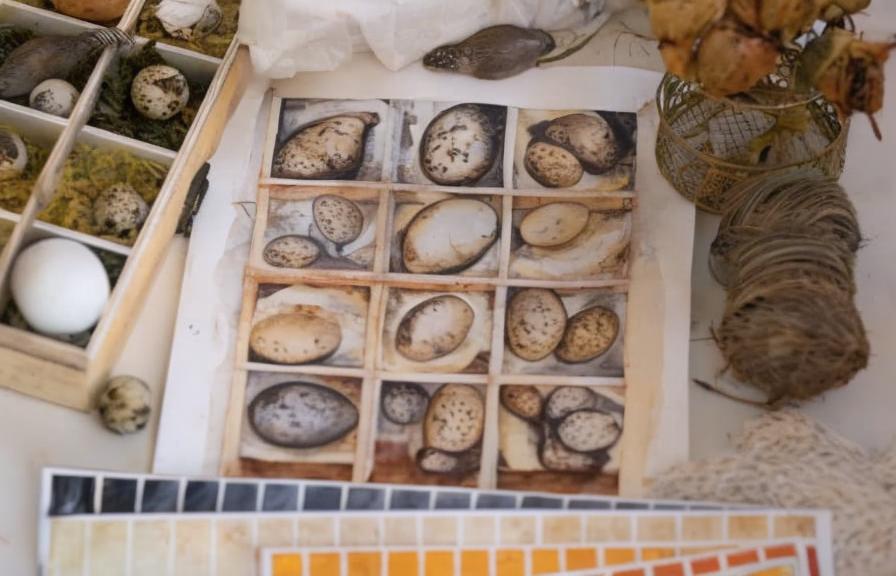
Caring for quail chicks is an important aspect of successful quail breeding. Once the eggs hatch, it’s crucial to provide proper care and nutrition to ensure the health and well-being of the chicks. Quail chicks are delicate and require a warm and secure environment to thrive. Providing a brooder with suitable bedding, heat lamps, and access to food and water is essential for raising healthy quail chicks.
Quail chicks should be provided with a high-protein diet that meets their specific nutritional needs for growth and development. It’s important to monitor the chicks closely for any signs of illness or distress and provide prompt veterinary care if needed. Additionally, providing a clean and safe environment that minimizes stress and potential hazards is crucial for promoting the overall health and welfare of the quail chicks. By caring for quail chicks with proper nutrition, warmth, and attention, breeders can ensure the successful growth and development of their offspring.
Maximizing Quail Breeding Success
Maximizing quail breeding success requires careful planning, attention to detail, and proactive management practices. By understanding the natural breeding period of quails and providing the right environmental conditions, nutrition, and care, breeders can enhance the overall success of their breeding program. Selecting healthy and genetically desirable breeding stock is essential for producing strong and productive offspring.
Creating a suitable breeding environment that meets the social, nesting, and environmental needs of quails is crucial for promoting successful breeding behavior. Managing quail breeding behavior effectively by monitoring natural behaviors, addressing any issues promptly, and providing proper care can help maximize reproductive success. Caring for quail chicks with proper nutrition, warmth, and attention is essential for raising healthy offspring.
By implementing these strategies and best practices, breeders can maximize quail breeding success and enjoy the rewards of a thriving and productive quail population. With careful planning and attention to detail, breeders can create a successful quail breeding program that produces strong and healthy offspring year after year.
If you’re interested in learning more about quail breeding periods, you might also want to check out this informative article on how to care for goslings. Understanding the breeding and care of different poultry species can provide valuable insights and knowledge for anyone looking to raise birds on their property.
FAQs
What is the breeding period for quails?
The breeding period for quails typically occurs during the spring and summer months when the days are longer and the temperatures are warmer.
At what age do quails start breeding?
Quails generally reach sexual maturity and start breeding at around 6-8 weeks of age.
How long does the breeding season last for quails?
The breeding season for quails can last for several months, typically from spring through early summer.
How often do quails lay eggs during the breeding period?
Quails are prolific layers and can lay eggs every 1-2 days during the breeding period, with peak egg production occurring in the early part of the season.
What are the ideal breeding conditions for quails?
Ideal breeding conditions for quails include longer daylight hours, warmer temperatures, and access to a balanced diet rich in protein and calcium to support egg production.
How can I encourage successful breeding in my quail flock?
To encourage successful breeding in quails, provide a stress-free environment, adequate nesting boxes, and a balanced diet. Monitoring the health and behavior of the quails is also important for successful breeding.
Meet Walter, the feathered-friend fanatic of Florida! Nestled in the sunshine state, Walter struts through life with his feathered companions, clucking his way to happiness. With a coop that’s fancier than a five-star hotel, he’s the Don Juan of the chicken world. When he’s not teaching his hens to do the cha-cha, you’ll find him in a heated debate with his prized rooster, Sir Clucks-a-Lot. Walter’s poultry passion is no yolk; he’s the sunny-side-up guy you never knew you needed in your flock of friends!

